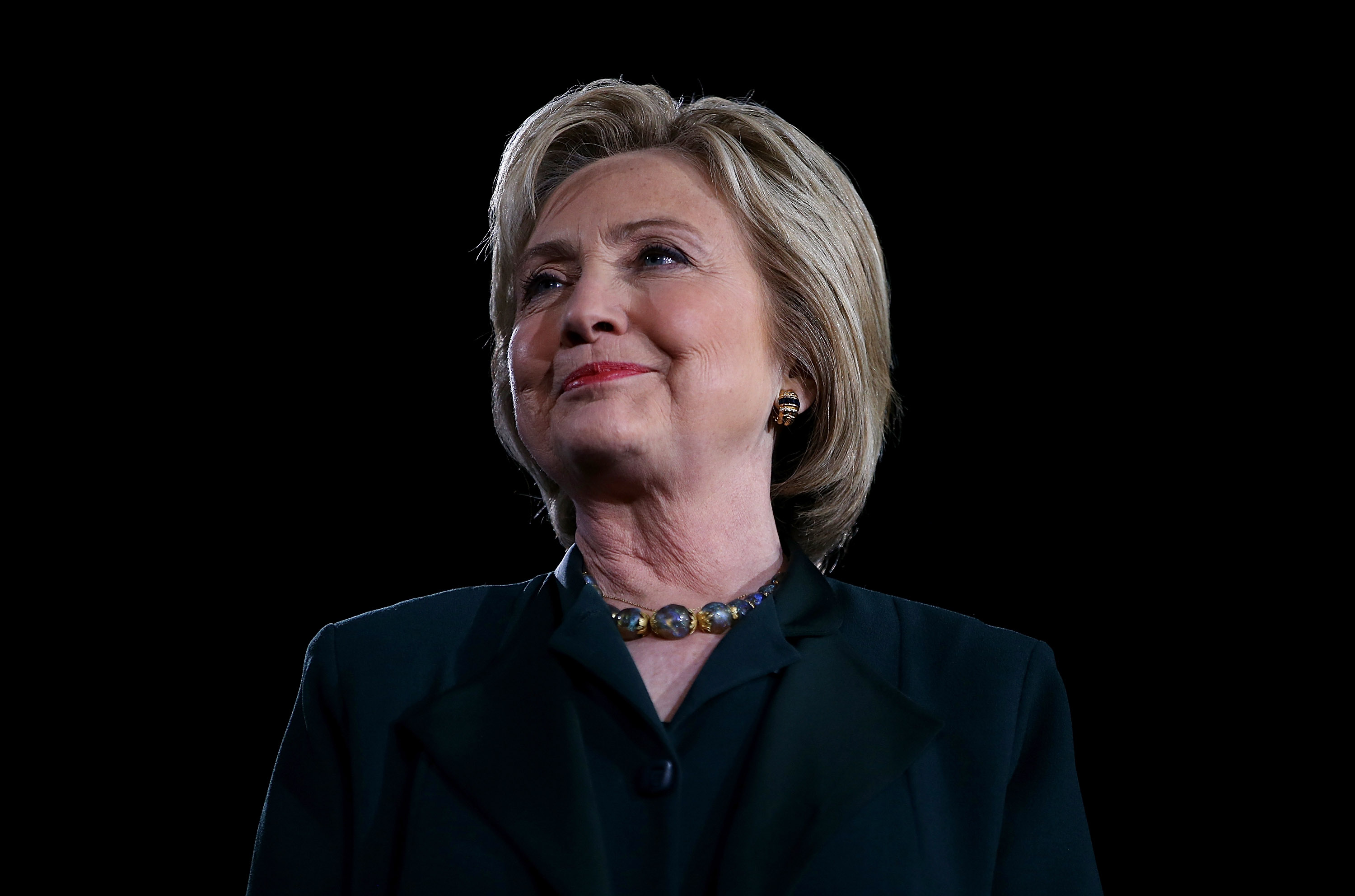Hillary Clinton's winning trait: Loyalty
If Hillary Clinton wants to establish a strong and effective contrast with Donald Trump, she should look to one of the darkest times in her life


Hillary Clinton has a fundamental problem going into the general election against Donald Trump — as well as a fundamental opportunity.
The problem is that people think they know Clinton, and the person they know is someone they don't like — and, much more important, don't trust. Voters don't trust Trump either — but he's the new flavor, and has the advantage if he is allowed to define the contest as a referendum on Clinton and the status quo.
Before that happens, Clinton needs to define herself for this election, in terms that reflect who she really is, but in a positive way, and that connect emotionally with the electorate at large and, especially, with the segment of the Romney coalition where Trump may be most vulnerable: married white women. The opportunity to do that is rapidly approaching. The time to strike is right after she secures the nomination, and does what she needs to do behind the scenes to bring Bernie Sanders back into the fold. That's the point where people will be listening to her for the first time as the leader of her party. That's her chance to tell them who she is.
The Week
Escape your echo chamber. Get the facts behind the news, plus analysis from multiple perspectives.

Sign up for The Week's Free Newsletters
From our morning news briefing to a weekly Good News Newsletter, get the best of The Week delivered directly to your inbox.
From our morning news briefing to a weekly Good News Newsletter, get the best of The Week delivered directly to your inbox.
So who is she? What is the "best version" of Hillary Clinton, in terms of being able to connect to the public emotionally, establishing a strong and effective contrast with Donald Trump, and also being authentic to who she really is?
I find it useful in doing this kind of exercise to try to distill the answer down to the simplest terms possible. A single sentence — or even better, a single descriptive word.
For my money, Hillary Clinton's single word is: LOYAL.
Now, I can already hear folks on the left laughing. "Loyal" is your word for the authentic Hillary Clinton? The woman who betrayed her mentor, Marian Wright Edelman? Hey, who do you think she's loyal to — Goldman Sachs?
A free daily email with the biggest news stories of the day – and the best features from TheWeek.com
But last I checked, welfare reform was signed not by her, but by her husband. Last I checked, Glass-Steagall was repealed not by her but by her husband.
Who do I think she's loyal to? I think she's loyal to him.
And that's the rock on which I propose that she rebuild her emotional connection with married women.
Think back to the days of the Monica Lewinsky scandal. What would have happened to Hillary Clinton if she had not stood by her husband, but instead had gone into seclusion? If she'd planned her Senate run without him and filed for divorce right after her victory? It's impossible to know, of course, but it's hard to believe that anyone would have held it against her. If she handled it all with grace and class, it could have helped her enormously.
Why didn't she?
It's possible that she just plain loves him. That's what Barney Frank said at the time, and it may be true. It's possible that she was afraid to be without him — afraid, in particular that she couldn't hack it on her own politically. I wouldn't be at all surprised if Bill played on those fears. From the outside, we have no way of knowing the real reason — but I can say that these particular reasons are not particularly helpful to her, politically.
But it's possible that she didn't leave him because that's just not what she does. Because she's someone who sticks, someone who's loyal. And that's a reason that is helpful politically.
It aids her on a personal level. As I have said before, Hillary Clinton does best when people remember that she bleeds. And this was a time when she was cut pretty deep. Also, while people would have sympathized with her as a wronged woman if she had left Bill, I strongly believe that they can also sympathize with her as someone for whom preserving the marriage was just more important than her own hurt feelings. Plenty of women have done the same.
It's also helpful on a political level. "Pragmatist" is an ugly word this season, particularly on the Democratic side. Clinton is pretty fully committed to rehabilitating the word — but how do you do it, emotionally? How do you tell a story that makes someone see sacrificing some of your integrity as a positive? A lot of progressives in this election are clearly yearning for someone who is pure. Well, someone who cared about being pure more than being loyal would have left Bill after Monica. But the pure are left alone. Is that where progressives want to be?
Meanwhile, if you want to talk about a contrast to Donald Trump, that's the contrast to draw. It's not just that Trump has unceremoniously dumped two wives. He's also blatantly ditched investors, leaving them holding the bag in his multiple business bankruptcies — and then bragged about it afterwards. As a candidate, he switches policy positions minute by minute — and denies having done so even when presented with recorded proof of his prior statements (as, for example, with his supposed opposition to Hillary Clinton's war in Libya).
The point isn't that Trump is a "flip-flopper" — someone who moves whatever way the wind blows. Voters might not mind that so much if the wind is blowing their way, or if they think they can blow harder than the wind. The point is that Trump cuts and runs. He's built his career on rolling the dice and leaving somebody else to pay his debts when he comes up snake eyes. And this is the man who we're supposed to believe will now be "greedy for America?"
That's not the way Hillary Clinton rolls. It's not just that she's not the type — it's that she knows the type. She is intimately familiar with the type of man who lies, and cheats, and depends on someone else to clean up his messes. She just has to remind us about that part of her life, and we'll make the connection ourselves.
And once an emotional connection is formed around this word, "loyal," it can be put to use in multiple contexts. Foreign policy is one obvious place. Clinton's hawkishness is almost certainly a net-liability for her, but the best spin that can be put on it is to call her loyal to the commitments America has already made and to the men and women of our armed forces. Meanwhile, the worst spin that can be put on Trump's incoherent ramblings isn't that he's a neo-isolationist, but that he's somebody who will make commitments and abandon them at the drop of a hat, leaving allies and enemies alike bewildered and, frankly, contemptuous.
In domestic policy as well, Clinton ads that read like bragging — I'm such a fighter; I work so hard; you should be grateful to have someone like me as your president — can be recast as statements not about how we should feel about her, but how she feels about us. That we're the people she'll be loyal to, now that she's the boss.
Obviously, she isn't going to want to do this. And it may not be necessary. Consolidating the support of Democrats and Democratic-leaning independents after securing the nomination may be enough to restore her lead. Trump could discover that his act plays really well with 30 percent of the population, not so great with 20 percent, and terribly with 50 percent. The economy could get stronger, and Obama could get more popular, giving Clinton a powerful tailwind. Anointed successors to two-term incumbents lost narrowly in 1960, 1968, and 2000, and lost dramatically in 1952 and 2008. But maybe this year will be like 1988, currently the sole post-war exception to the rule.
But Trump is going to go there whether she wants him to or not. He's already calling her an enabler of her husband's misdeeds. Taking the high road and refusing to engage is much better than slinging personal mud back at him — but it can also look haughty and aloof, exacerbating the sense that voters have that Clinton considers herself better than the rest of us. That tack may be a missed opportunity to take the very personal issues that Trump wants to use to attack her and turn them to her advantage, by making her seem both more human and more noble.
This one time, it might be worth it to gamble.
This is the third article in a three-part series. You can read part one here and part two here.
Noah Millman is a screenwriter and filmmaker, a political columnist and a critic. From 2012 through 2017 he was a senior editor and featured blogger at The American Conservative. His work has also appeared in The New York Times Book Review, Politico, USA Today, The New Republic, The Weekly Standard, Foreign Policy, Modern Age, First Things, and the Jewish Review of Books, among other publications. Noah lives in Brooklyn with his wife and son.
-
 Vance’s ‘next move will reveal whether the conservative movement can move past Trump’
Vance’s ‘next move will reveal whether the conservative movement can move past Trump’Instant Opinion Opinion, comment and editorials of the day
-
 Why recognizing Somaliland is so risky for Israel
Why recognizing Somaliland is so risky for IsraelTHE EXPLAINER By wading into one of North Africa’s most fraught political schisms, the Netanyahu government risks further international isolation
-
 Crossword: December 30, 2025
Crossword: December 30, 2025The daily crossword from The Week
-
 Bari Weiss’ ‘60 Minutes’ scandal is about more than one report
Bari Weiss’ ‘60 Minutes’ scandal is about more than one reportIN THE SPOTLIGHT By blocking an approved segment on a controversial prison holding US deportees in El Salvador, the editor-in-chief of CBS News has become the main story
-
 Has Zohran Mamdani shown the Democrats how to win again?
Has Zohran Mamdani shown the Democrats how to win again?Today’s Big Question New York City mayoral election touted as victory for left-wing populists but moderate centrist wins elsewhere present more complex path for Democratic Party
-
 Millions turn out for anti-Trump ‘No Kings’ rallies
Millions turn out for anti-Trump ‘No Kings’ ralliesSpeed Read An estimated 7 million people participated, 2 million more than at the first ‘No Kings’ protest in June
-
 Ghislaine Maxwell: angling for a Trump pardon
Ghislaine Maxwell: angling for a Trump pardonTalking Point Convicted sex trafficker's testimony could shed new light on president's links to Jeffrey Epstein
-
 The last words and final moments of 40 presidents
The last words and final moments of 40 presidentsThe Explainer Some are eloquent quotes worthy of the holders of the highest office in the nation, and others... aren't
-
 The JFK files: the truth at last?
The JFK files: the truth at last?In The Spotlight More than 64,000 previously classified documents relating the 1963 assassination of John F. Kennedy have been released by the Trump administration
-
 'Seriously, not literally': how should the world take Donald Trump?
'Seriously, not literally': how should the world take Donald Trump?Today's big question White House rhetoric and reality look likely to become increasingly blurred
-
 Will Trump's 'madman' strategy pay off?
Will Trump's 'madman' strategy pay off?Today's Big Question Incoming US president likes to seem unpredictable but, this time round, world leaders could be wise to his playbook
